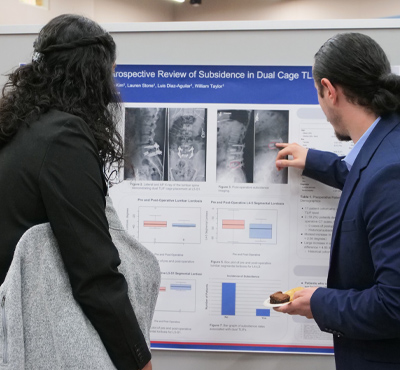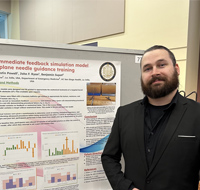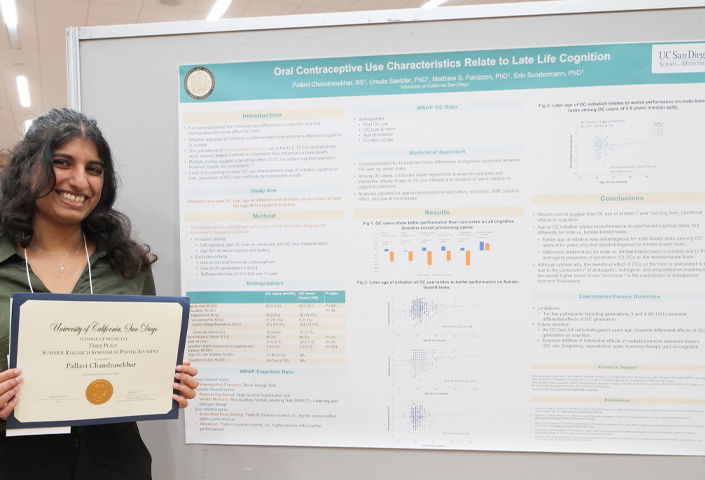Medical Student Research Shines in Symposium
Story by:
Media contact:
Published Date
Story by:
Media contact:
Topics covered:
Share This:
Article Content
Each summer, UC San Diego School of Medicine students are encouraged to pursue a summer research project to further their medical education and gain valuable research experience. That research was on display at the annual Summer Research Symposium on January 18. More than 100 students presented their research posters showcasing a vast array of projects.
By encouraging students to pursue research which aligns with their interests, the Summer Research Training Program emboldens students to think critically while seeking answers and insights into a variety of health-related issues. Many students create their own questions based on what they are learning in the classroom, while others use personal interests or social issues as the impetus for their projects.
“The summer research program allowed me to explore a field of medicine that I am interested in,” said Mitchell Wong, second-year medical student, who worked on cardiology research last summer. “Through the research project, which provided a foundation for future projects and collaboration with my principal investigator, I gained valuable research skills such as abstract writing, poster making, and data analysis.”
For students like Veena Do, third year medical student, whose research focused on social determinants of health (non-medical factors that influence health outcomes) and how they intersect with opioid use among those with chronic pain, the research program has been helpful in not only clinical research skills but also increasing self-confidence while also improving public speaking, organizational and goal setting skills.

“Our Summer Research Symposium is a highlight every year because we get to see the amazing work of our students,” said Kama Guluma, MD, associate dean for admissions and student affairs. “It really represents our students’ work and the amazing collaboration between our students and our faculty. We get to see the innovativeness that is here at UC San Diego.”
For their projects, each student is paired with a faculty member who serves as the principal investigator (PI). They oversee the student’s work and offer suggestions, encouragement and support to assist the students in creating a question and finding potential answers to that question.

Second-year medical student Austin Powell’s project was unique in that he actually built a simulation training device to provide students with in-plane needle guidance training. The relatively inexpensive, easy to reproduce device included positive and negative light indicators to assist students in understanding if their technique was correct or not.
“One big thing about medical school in general is it's all about simulation training,” said Powell, referring to the tools used to mimic real-life procedures for medical students. “I wanted to build something that trains medical students and residents on a whole new technique of anesthesia that we can apply in the emergency room.”
Based on Powell’s research, his device resulted in 95 percent of participants noting an increased level of confidence in the procedure. Future considerations for Powell include further training and redesigning the model based on participant feedback.
“Working with the students is fun,” said Gupta. “This is how science progresses, we need people to be involved with research, otherwise we're not going to see the changes we want and need.”
Second-year medical student Zoe Matticks conducted research looking at trends in the association of family history as a risk factor for early-onset colorectal cancer using the California Teachers Study. Her PI, Samir Gupta, MD, professor of medicine in the Division of Gastroenterology, explained that Matticks’ project began to answer questions that he had long been pondering but didn’t have the data necessary to make any conclusions.
“We know that early onset colorectal cancer has been increasing over time and about every time I gave a talk about the changing epidemiology of colon cancer, a perceptive audience member will ask me if we should start screening those with a family history sooner as a result of the overall trends in increasing early onset incidence,” said Gupta. “This project allowed us to look at the California teachers cohort, which we think has enough colon cancer cases and people with and without a family history, to be able to see whether some of the trends we're seeing with increasing early-onset colorectal cancer are also being seen in people who have a family history.”
Matticks’ project concluded that, consistent with prior studies, family history was associated with higher risk for colorectal cancer. However, additional studies are needed to evaluate whether the initial screening age should be lowered.
Not all the students’ research focused on patients directly. For second-year medical student, Matt Allen, Artificial Intelligence (AI) was what interested him the most last summer. His project, “Building AI Capacity in the UC San Diego Department of Family Medicine,” looked at physician attitudes and perspectives concerning the use of AI for chronic disease management. Through a series of interviews, Allen discovered that most primary care physicians he spoke with are highly receptive to the use of AI in primary care. Their concerns are not necessarily with the reliability of the technology, but rather how AI impacts the patient relationships, implementation into the current workflow and other non-technical factors such as reimbursement and time. Allen's research was recently published in BioMed Central.
Whether the students were researching specific disease patterns, new devices, treatment options, or environmental health impacts, they all agreed that the summer research project enhanced their medical education.
“The summer research program was a great way to spend the time between my first and second year and just get further involved within the School of Medicine and surrounding fields of interest in research,” said Nicole Howard, second-year medical student, whose research project analyzed the diagnostic accuracy of multiband diffusion-weighted imaging in determining malignant breast masses. “I learned a lot about myself, both in how I balance my workload and my classroom load, but also just new ways that I can challenge myself to explore new topics and new technologies that I think are interesting in developing fields.”
As part of the Summer Research Symposium, a panel of faculty members select the top three for recognition. Winners were: Pallavi Chandrasekhar, first place; Sheila Noon, second place; and Ha Mieu Ho, third place. The posters are judged on the following criteria: scientific merit, clarity and overall presentation.

You May Also Like
Stay in the Know
Keep up with all the latest from UC San Diego. Subscribe to the newsletter today.



